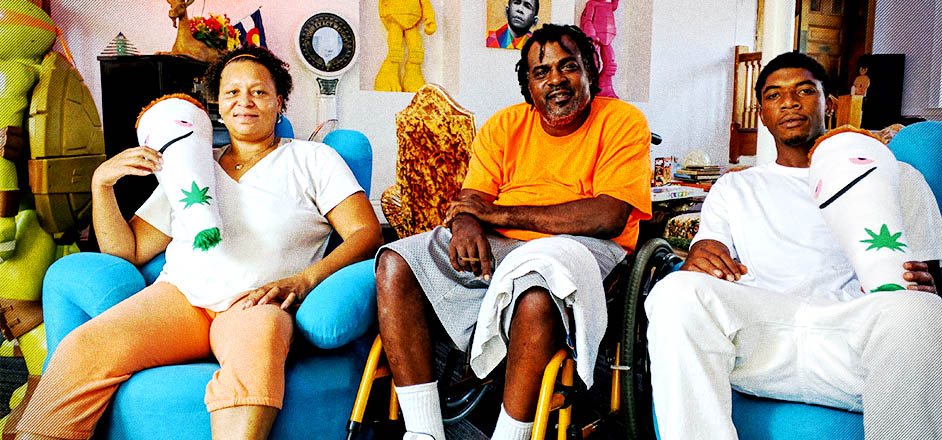The International Church of Cannabis in Denver, Colorado, says it’s the largest indoor space for cannabis smoking in the world.
Folks come from across the country to see it and surmount huge obstacles. Because they see huge promise.
Picture this scene from a recent Friday: There's a service in the second-floor chapel. At the bottom of the old, creaky wooden steps, sits Al Pollard, 48, in his wheelchair.
Pollard has been a paraplegic since a diving accident at 18. He's a Pentecostal minister in Tupelo, Mississippi. He drove here to see the church firsthand.
Weed has been a godsend for him, he says. It helped him get off the pills for spasms and tingling. He even stopped taking his blood pressure medication, because he thinks pot will relax him so much he won't need Coumadin. Sixteen pills, replaced by pot.
"The plant is Him," Pollard says, in his preacher's voice. "Whoever put the sun in the sky, the fish in the sea, he put this plant in the ground." He thinks pot will get him up out of that wheelchair to walk again. "There's a miracle coming for me," he says.
Two months ago, he started his own cannabis church in Mississippi, inspired by this one. In Pollard's First Movement of Cannabis, he's "taking Pentecostalism and adding cannabis." He also believes that having a cannabis church will give him a place to legally smoke, something he can do nowhere, legally, in Mississippi.
He's not walking yet, though. As services started, volunteers grip the wheelchair and haul Pollard up to see his God.
No matter how much faith it inspires in believers, critics say the International Church of Cannabis is a fraud. It's a sneaky way to get around the laws against public pot smoking by claiming God is on their side.
Denver authorities seem to agree. On April 20, the church’s opening day, undercover police officers entered the celebration uninvited. They wrote citations to three of the founders.
Their court date is Sept. 25. The three face a collective fine of $1,200. Lee Molloy, one of the founders set to go on trial, says they're being "persecuted" by an "authoritarian" city "trampling on our constitutional right to practice our religion." There's a huge, complicated legal fight going on. The church is arguing that it's a religion, and as such should be exempt from laws that govern its sacrament. The city disagrees. It might take a Supreme Court ruling to decide.
While all that rolls on, the religion grows. "I'm seeing the growth, week by week," says Steve Berke, one of the founders. It's attracting new members — there are 3,000 members now — holding more stoned church potlucks with BBQ and cinnamon rolls, more stoned yoga classes with chanting and heavy sativa, and more stoned services, which average 30 or 40 attendees each.
On Saturday afternoons, in the chapel, Jimmy Smrz holds his weekly vinyasa yoga class. He sets the scene by playing Krishna Das songs on the accordion, changing the lyrics from Hindu themes to cannabis ones.

[At the church's yoga services, they inhale sativa before they exhale downward dog. Photo by Reilly Capps]
During visiting hours on Saturday, there are sometimes so many visitors they clog up the door. The church asks for a $5 donation to come in. They've come from Maryland, California, Chicago. They found it on Atlas Obscura or Facebook. They gape at the hyper-colorful, surrealist ceiling in the main chapel. They stare at the life-size Teenage Mutant Ninja Turtle statues in the "fellowship" space down below. They giggle at the chairs shaped like hands holding a joint.
Upon arrival, everyone is met at the door by the church's mascot, a kindly yellow lab mix named Munchie. And also by Berke, an excitable, friendly man whose family bought the 1904-built church for $1.1 million. They considered turning it into condos before Berke convinced them to let him start a church.
Berke is a comedian and rapper. He makes parody songs, Weird Al style, about pot. Macklemore's "Thrift Shop" became "Pot Shop," and got millions of hits. His main job is running Bang Digital Media, a marketing company promoting pot products.
To all the visitors, Berke gives a spiel that is heavy on name dropping: he talks about the artists who painted the church: Kerry Scharf, whose works hang in the MoMA, did the outside. And Okuda San Miguel, who also painted Alicia Keys and Swizz Beatz's house, did the nave, which he calls "the Sistine Chapel of Marijuana."
He also gives a quick intro to Elevationism, which is what they call their religion:
"An individual's spiritual journey and search for fulfillment is a personal experience that can be heightened and deepened with ritual cannabis use," Berke says, as if reciting from memory. "This is not a replacement for your existing faith. It's more a supplement to it. For those of you that are practicing Christians, there's a verse in the bible, Genesis 1:29 that says, 'Behold, I shall give you every herb-bearing seed on this whole Earth.' … Cannabis helps you elevate yourself to a better version of self."
It's a pretty simple, appealing message if you're a cannabis. You'd think they'd be swimming in success. But the founders say they're still struggling.
"People have this mystical magical idea that we're trying to make money," Molloy says, "but if someone can tell me where the money is, I'd be happy."
In fact, church leaders say they're doing a crowdsourced fundraiser to fix the water heater. If they don't start attracting more donations, they might have to close their doors. Plus there's the court date coming up. Plus, all the skeptics.
"Sometimes," Molloy sighs, "I wish we had just let Steve's parents turn it into condos."
Yet members like Pollard and Smrz still deeply believe.
"In my eyes, this is the true church, right here," Pollard says.





Leave a Reply